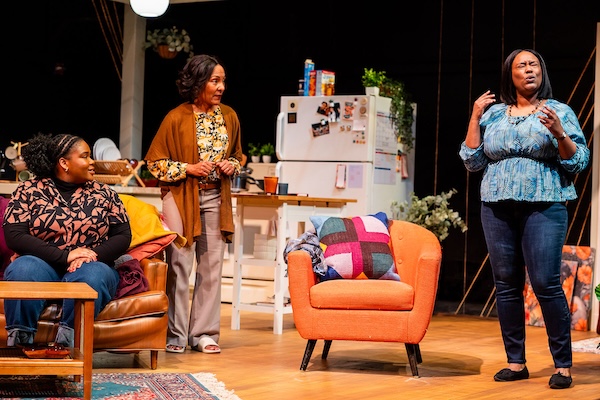Theater Review: “Her Portmanteau” — Unpacking Emotional Baggage
By Bill Marx
This is the most slickly engaging of Mfoniso Udofia’s scripts so far, its domestic melodrama enlivened by welcome humor, detailed characterizations, and moments of pathos.
Her Portmanteau by Mfoniso Udofia. Directed by Tasia A. Jones. A co-production of Central Square Theater and Front Porch Arts Collective at Central Square Theater, 450 Mass. Ave, Cambridge, through April 20.

Lorraine Victoria Kanyike, Patrice Jean-Baptiste, and Jade A. Guerra in the Central Square Theater and Front Porch Arts Collective staging of Her Portmanteau. Photo: Maggie Hall Photography
The fourth part of Mfoniso Udofia’s nine-play cycle about three generations of a Nigerian-American family, Her Portmanteau, poses a healing response to the trauma set up in the first, Sojourners. That drama ends with Abasiama Ufot announcing, in 1978, that she has decided to stay in America and not return to Nigeria with her husband and child. The second play, The Grove, battens down on one of the overarching themes of the cycle — the struggle to knit together what’s been separated, the ordeal of immigrants to create a continuity of spirit, history, and family. I have not yet heard the podcast version of the third play in the series, runboyrun, but it probes how the Biafran War contributed to the debilitating mental illness of Abasiama’s second husband, Disciple. Perhaps he cannot be put back together. Her Portmanteau dramatizes how a mother in America and a child brought up in Nigeria can overcome decades of estrangement and emotionally bond for their mutual benefit. This is the most slickly engaging of the scripts so far, its domestic melodrama enlivened by welcome humor, detailed characterizations, and moments of pathos. The Central Square Theater and Front Porch Arts Collective staging, if sometimes a bit too obvious, needlessly underlining when it should stand back, does right by this moving play.
The action of this three-hander takes place on a single day in 2014 at the rented apartment of Adiaha Ufot (Lorraine Victoria Kanyike) in the Inwood section of New York City. The 30-something is being forced to serve as the well-intentioned but verbally maligned referee between her mother, the 60-something Abasiama (Patrice Jean-Baptiste), and Iniabasi Ekpeyong (Jade A. Guerra), the 30-something daughter who was raised in Nigeria by Abasiama’s former husband. The reunion starts off rockily, and the friction isn’t just inspired by seriocomic culture shocks: Iniabasi seethes with resentment, compounded by feelings of abandonment, jealousy, and anger at changed plans (she had been told that her final destination would be Abasiama’s home in Worcester, MA). Abasiama is apologetic and overcome with guilt, while the even-keeled Adiaha is doing her patient best — in the face of considerable taunting — to help bring the two together. The device of Iniabasi’s suitcase — the revealing photos it holds — eventually supplies the stabilizing emotional connection, a primal link reinforced by a renewed dedication to the family’s future. Various truths, hidden by both sides, come out.
Director Tasia A. Jones’s staging sometimes slips into sitcom rhythms, but generally she is sensitive to the script’s zigzagging shifts in tone, from one-liner comedy to confused defensiveness and painful introspection. A lot of emotional baggage is unpacked in a short period of time and, in order to build up to the reassuring windup, Udofia resorts to some dramaturgical shortcuts, such as removing a character via a long, long phone call. Unlike Sojourners and The Grove, some of whose figures were one-dimensional, all three of the characters here are nuanced, contending mightily with contradictory impulses. The performances are strong — Jean-Baptiste nicely balances Abasiama’s maternal instincts with sudden spurts of aggressiveness, while Kanyike adds some rousing spikiness to Adiaha’s placating sanity. Guerra occasionally makes Iniabasi’s bitterness overly pronounced — it boils over early when it might have been more effective to let it simmer.
Ekpeyong’s suitcase proves to be a potent device, its collection of family photographs packing enough Proustian punch to trigger the poignant, if predictable, final scene. (Bring a box of tissues.) That said, the family album aspect of the portmanteau also highlights certain limitations of the empowerment genre; like much contemporary American theater, Her Portmanteau dramatizes the trials and tribulations of domestic life rather than interrogating the repressive political power structures that frame it. Hopefully, facts on the ground — marked by current threats of American authoritarianism and rising oligarchy — will inspire stage companies (while artistic freedom persists) to move beyond well-trod tropes about familial mending and tackle broader questions about an abusive government’s retreat from democratic ideals.
Bill Marx is the editor-in-chief of The Arts Fuse. For over four decades, he has written about arts and culture for print, broadcast, and online. He has regularly reviewed theater for National Public Radio Station WBUR and The Boston Globe. He created and edited WBUR Online Arts, a cultural webzine that in 2004 won an Online Journalism Award for Specialty Journalism. In 2007 he created The Arts Fuse, an online magazine dedicated to covering arts and culture in Boston and throughout New England.
